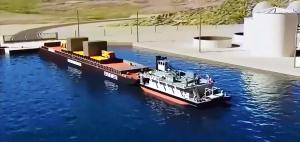Second test convoy, with maritime leg this time
14 Mar 2014
-
R.A.
Pushed by a tug boat, the 80-metre barge coupled with a 65-metre pontoon will ferry the trailer and dummy load across the inland sea Étang de Berre.
In September last year, at the time of the first ITER Itinerary test convoy, the crossing of the inland sea Étang de Berre had to be cancelled: the barge that was to ferry the trailer and its 600-tonne dummy load was stranded in Turkey because of weather conditions.
A second test convoy campaign, focusing this time on the rehearsal of logistics and timing, is scheduled from 31 March to 4 April. Weather permitting, the maritime leg of the journey should be one of the most spectacular parts of the operation.
In order to ferry the components from Fos harbour, on the Mediterranean Sea, to Port-de-la-Pointe, on the north-eastern shore of the Étang de Berre, a combination of conventional barge and heavy-lift pontoon will be used. The 26-kilometre voyage will take four hours.
On Wednesday 12 March, a representative of DAHER, ITER's Global Transport, Logistics and Insurance Service Provider, presented a captivating animation to the ITER community on how the barge and pontoon will operate, and how the trailer and its 600-tonne dummy load will be loaded and unloaded.
François Genevey is the project director for the ITER contract at DAHER. "The crucial moments in the port operations are when the ITER loads are rolled onto and off of the barge. An electronic ballasting system will ensure that the barge and the pontoon maintain their full stability during the transfer of the charge."
Once the maritime leg of the journey is past, the trailer will commence its slow and careful ride to the ITER site just as it did six months ago.
This time, instead of verifying how critical points along the Itinerary hold up under the load, operators from DAHER and Agence Iter France will test the complex logistics involved (more than 200 people will take part in the operation) and validate the projected timing for the transportation of the most taxing of the ITER components in terms of size and weight.
Of a projected 250 Highly Exceptional Loads (HELs) to be delivered to the ITER site, approximately 30 belong in that category.
But HELs are not all—close to 2,500 Conventional Exceptional Loads (CEL), and several thousand container-sized loads will travel the regular roads to the ITER site between mid-2014 and end-2020.


